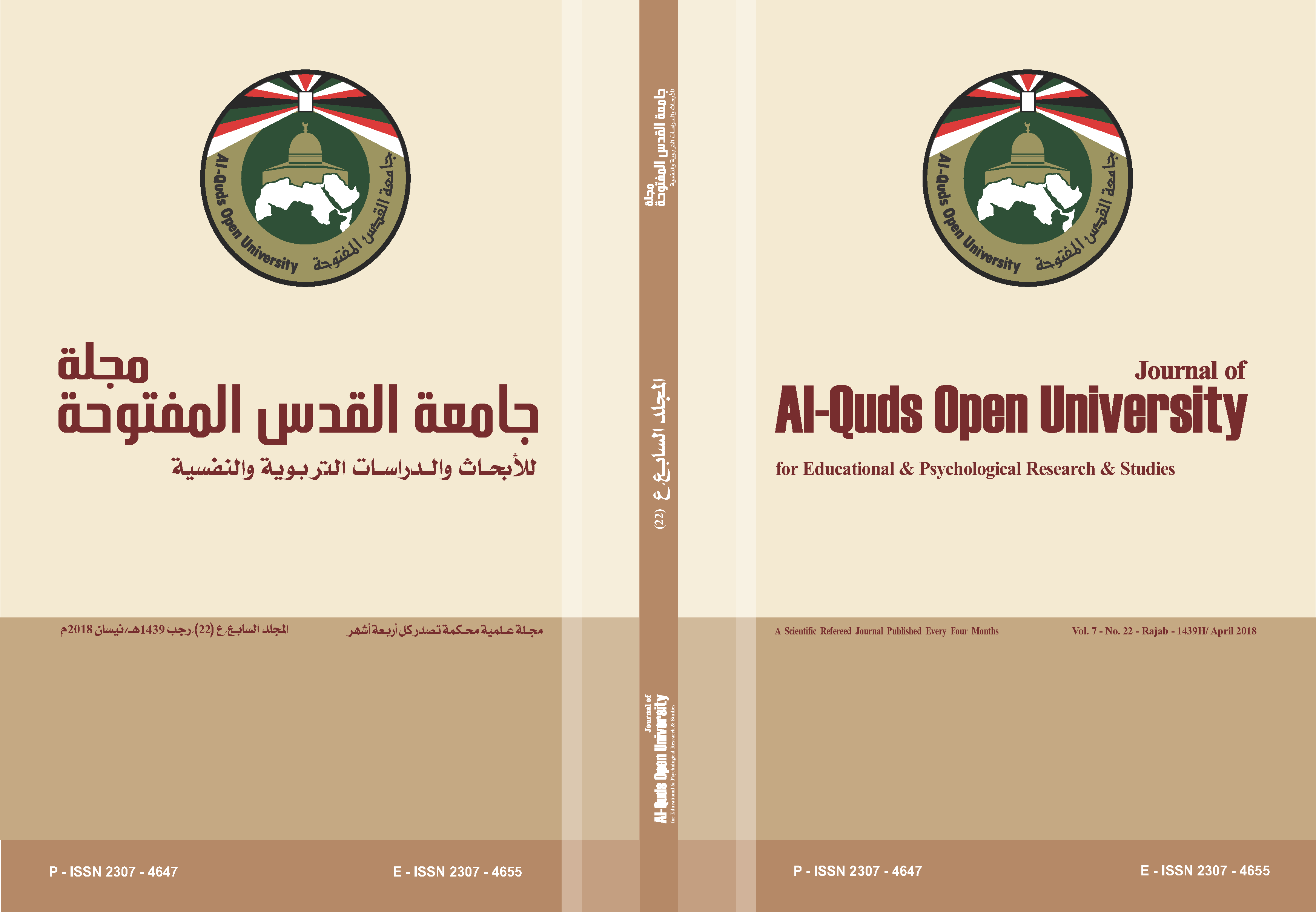الانهماك في العمل وعلاقته بالاعتقاد بفعالية الذات والتمكين لدى مديري مدارس منطقة الأغوار الشمالية في الأردن
الكلمات المفتاحية:
الانهماك في العمل – الاعتقاد بفعالية –التمكينالملخص
هدفت هذه الدراسة التعرف إلى درجة الانهماك في العمل، وعلاقته بالاعتقاد بفعالية الذات والتمكين لدى مديري المدارس في لواء الأغوار الشمالية، وتحديد الفروق ذات الدلالة الإحصائية بين المشاركين التي تعزى لمتغيرات: المؤهل العلمي، والخبرة، والجنس. لتحقيق هذا الهدف طبقت الدراسة المنهج الوصفي وتم توزيع استبانة من 60 بندا موزعة على المجالات الثلاث، على 77 مديرا في منطقة الأغوار الشمالية حيث كانت العينه مقصودة وذلك لصغر حجمها. أظهرت النتائج أن المشاركين أوردوا معدلات عالية من الاعتقاد بفعالية الذات حيث حصل محور الاعتقاد بفعالية احداث النتائج على المرتبة الأولى بوزن نسبي قدره (4,24 (ثم الاعتقاد بالفعالية الإدارية الشخصية بالمرتبة الثانية بوزن نسبي قدره ( 4,22) ، بينما احتل محور الاعتقاد بالفعالية الإدارية العامة المرتبة الأخيرة، وبوزن نسبي قدره(3,19). وكانت متوسطات جميع فقرات محور الاعتقاد بالفعالية الادارية الشخصية وفعالية إحداث النتائج مرتفعة بينما جاءت جميع فقرات محور الاعتقاد بالفعالية الإدارية العامة متوسطة. أما التمكين فقد جاءت المحاور مرتبة على النحو التالي من الأعلى إلى الأدنى: المكانة، ثم الاستقلالية، ثم التأثير، ثم اتخاذ القرار، ثم النمو المهني؛ وبأوزان نسبية من الأعلى للأدنى على النحو الآتي: (4.57 و 4.55 و 4.38 و 4.29 و 4.12 على التوالي. كما جاءت الأوزان النسبية لفقرات التمكين مرتفعة باستثناء فقرة واحدة حصلت على متوسط معتدل. أما بالنسبة للانهماك فقد جاء محور "الإخلاص "في المرتبة الأولى بوزن نسبي قدره (4.61) يليه النشاط بوزن نسبي قدره (4.34) وأخيرا "الانغماس " بوزن نسبي قدره (3.97). وقد جاءت جميع فقرات الانهماك مرتفعة باستثناء فقرة واحدة جاءت بمتوسط معتدل.
وأشارت النتائج عن عدم وجود فروق دالة إحصائيًا عند مستوى الدلالة α=0.05 بين الأوساط الحسابية لدى المشاركين تُعزى لمتغيرات (الجنس، المؤهل العلمي، الخبرة) باستثناء عن وجود فرق دال إحصائيًا عند مستوى الدلالة α=0.05 بين الوسطين الحسابيين لمجال التمكين من السلطة يُعزى لمتغير (الخبرة)؛ لصالح مديري المدارس ذوي الخبرات الأقل (خمس عشرة سنة فأدنى) مقارنةً بنظرائهم ذوي الخبرات المتقدمة (أعلى من 15 سنة). وأوصت الدراسة بإثارة الوعي بالاعتقاد بفاعلية الذات وبخاصة الاعتقاد بالفعالية الإدارية العامة. وقد يحتاج الأمر إلى برامج تدخلية وتدريبية لتدريب المديرين على رؤية مدارسهم في سياقها العام، وتغيير ثقافة العمل السائدة. وقد ينصح بانتهاج استراتيجيات إدارية جديدة مثل الإدارة الذاتية، وفرق العمل خاصة متداخلة الاهتمامات.
التنزيلات
منشور
كيفية الاقتباس
إصدار
القسم
الرخصة
-
- الالتزام التام بأخلاقيات البحث العلمي.
- الالتزام التام بحقوق الملكية الفكرية.
- حقوق الطبع والنشر تؤول للمجلة.
- الحصول على موافقة المجلة لإعادة نشر البحوث أو ترجمتها.
- الالتزام التام بتعليمات هيئة تحرير المجلة.







2.png)






_2.png)

